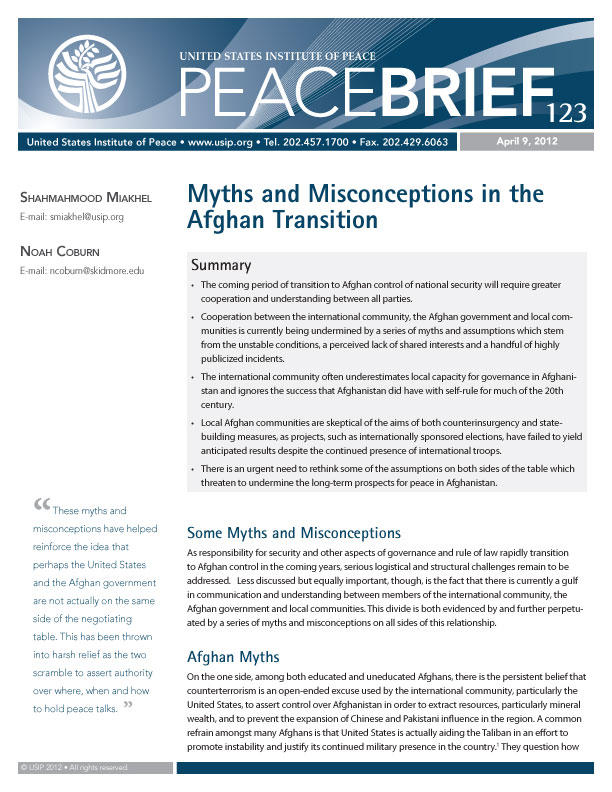Myths and Misconceptions in the Afghan Transition
The authors have worked for many years in the Kabul office of the United States Institute of Peace in Afghanistan on local governance and rule of law projects. Shahmahmood Miakhel is USIP's Country Director in Afghanistan. From 2003-2005 he was deputy minister of the Interior. Noah Coburn is a political anthropologist focusing on informal justice in Afghanistan and is currently teaching at Skidmore College. He has been conducting research in Afghanistan since 2005 and is the author of "Bazaar Politics: Pottery and Power in an Afghan Market Town." This report is based upon observations by the two authors, field visits to the south, east, southeast, west and center of the country, discussions with government officials, local leaders and members of the international community.

Summary
- The coming period of transition to Afghan control of national security will require greater cooperation and understanding between all parties.
- Cooperation between the international community, the Afghan government and local communities is currently being undermined by a series of myths and assumptions which stem from the unstable conditions, a perceived lack of shared interests and a handful of highly publicized incidents.
- The international community often underestimates local capacity for governance in Afghanistan and ignores the success that Afghanistan did have with self-rule for much of the 20th century.
- Local Afghan communities are skeptical of the aims of both counterinsurgency and statebuilding measures, as projects, such as internationally sponsored elections, have failed to yield anticipated results despite the continued presence of international troops.
- There is an urgent need to rethink some of the assumptions on both sides of the table which threaten to undermine the long-term prospects for peace in Afghanistan.
About this Brief
The authors have worked for many years in the Kabul office of the United States Institute of Peace in Afghanistan on local governance and rule of law projects. Shahmahmood Miakhel is USIP's Country Director in Afghanistan. From 2003-2005 he was deputy minister of the Interior. Noah Coburn is a political anthropologist focusing on informal justice in Afghanistan and is currently teaching at Skidmore College. He has been conducting research in Afghanistan since 2005 and is the author of "Bazaar Politics: Pottery and Power in an Afghan Market Town." This report is based upon observations by the two authors, field visits to the south, east, southeast, west and center of the country, discussions with government officials, local leaders and members of the international community.



